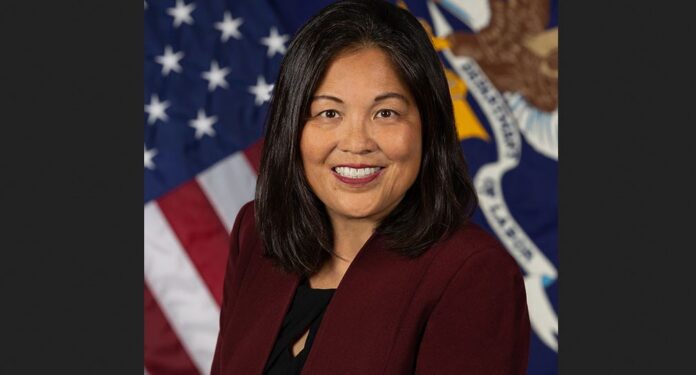By Matthew Yoshimoto
Acting Secretary of Labor Julie Su shared her gratitude Monday for being the only Asian American cabinet secretary in the Biden-Harris administration.
Katherine Tai, United States Trade Representative, and Vice President Kamala Harris are members of the cabinet, but are not considered cabinet secretaries.
“It is the honor of my lifetime to serve in President Biden’s cabinet,” said Su in her opening remarks. “It’s not something that I saw myself doing growing up. I certainly didn’t see many people look like me and those kinds of positions … [When I was nominated,] President Biden called me the American dream. And I know that he is not just talking about me, he’s talking about our entire community.”
Prior to joining the Department of Labor, Su served as Secretary of the California Labor and Workforce Development Agency after nearly 20 years as litigation director for the nonprofit Asian Americans Advancing Justice-Los Angeles. She took time yesterday to address some of the top issues facing the Asian American, Native Hawaiian and Pacific Islander communities.
As a child of Chinese immigrants, Su shared her excitement to continue working on workers’ rights and civil rights particularly in disenfranchised communities. Su noted ongoing efforts by the Department of Labor to make information more accessible by expanding the number of AANHPI language translations.
“Growing up and translating taught me a lot about the power of language, and as I grew up, I realized the law is really a language and you get to decide who gets what our society gets to work and who doesn’t, who gets paid and who doesn’t, who gets to migrate and march and marry and vote and partake in America,” Su said during the conversation. “Language access is so important.”
Noting that the Biden-Harris administration helped create over 15 million jobs since the pandemic, Su said that AANHPI immigrant workers play a part in “powering the economic recovery.”
However, Su discussed how many AANHPI immigrant workers have faced reported labor exploitation and unfair treatment despite the county’s labor laws applying to all regardless of immigration status. She explained employers often illegally weaponize one’s immigration status.
The best way to record workplace violations, Su explained, is to contact the local regional labor office, describing the offices as a “safe haven” for impacted workers.
“One of the things that we are doing is making sure that vulnerable workers understand they have rights,” Su told the audience during the conversation. “[We’re] partnering with community organizations that speak the language of vulnerable workers including aged care workers to make sure that they know their rights and they know they’re protected. The government has an important role to partner with those organizations so that we can also gain the trust of those workers so they can speak up and tell us about what’s going on.”
Since many AANHPI workers are independent contractors a part of the gig economy, or a market consisting of short-term contracts or freelance work, Su said one of the largest issues is misclassification of employment type. She noted that the Department of Labor works to resolve these concerns by clarifying standards for whether someone should be considered an employee or an independent contractor.
Su explained this misclassification may make workers believe they must make a tradeoff between having flexibility as a freelance worker or having full workplace protections as an employee. However, she said this is a “false choice,” noting that all employers should offer flexibility in jobs so as to retain workers and improve morale.
“Too often what we see is that people who work and getting jobs end up having to do two or three jobs in order to piece together a living, and that is fundamentally in opposition to the kind of economy that President Biden and I both believe is possible — one where we’re able to live well because they have a one job that pays them decent wages, that gives them the benefits and enough to retire with dignity,” Su said during the conversation.
Another issue she discussed was data collection, noting that the Bureau of Labor Statistics is working to offer a more “accurate picture” of AANHPI workers by disaggregating data that is used by policymakers. Su explained that past data collection failed to recognize the struggles of different AANHPI communities.
When asked what advice she would give to AANHPI community members who want to get into government like herself, Su said to not be afraid of entering into politics despite there being minimal AANHPI representation.
Su emphasized the importance for emerging AANHPI leaders to work in government since she said seeing others within the AANHPI community hold positions of power can help others feel “sane” and feel that they too are represented in political matters.
“Our commitment now to really bringing in and creating a federal government workforce that looks like America are so important for us to really serve the community. For the credibility of government and having a government that looks like the people that we serve gives people faith that the government really represents them, really speaks for them, really understand the issues that they face,” Su told the audience during the conversation.
AsAmNews is published by the non-profit, Asian American Media Inc.
We’re now on BlueSky. You can now keep up with the latest AAPI news there and on Instagram, TikTok, Facebook, YouTube and X.
We are supported by generous donations from our readers and by such charitable foundations as the Robert Wood Johnson Foundation.
You can make your tax-deductible donations here via credit card, debit card, Apple Pay, Google Pay, PayPal and Venmo. Stock donations and donations via DAFs are also welcomed.


